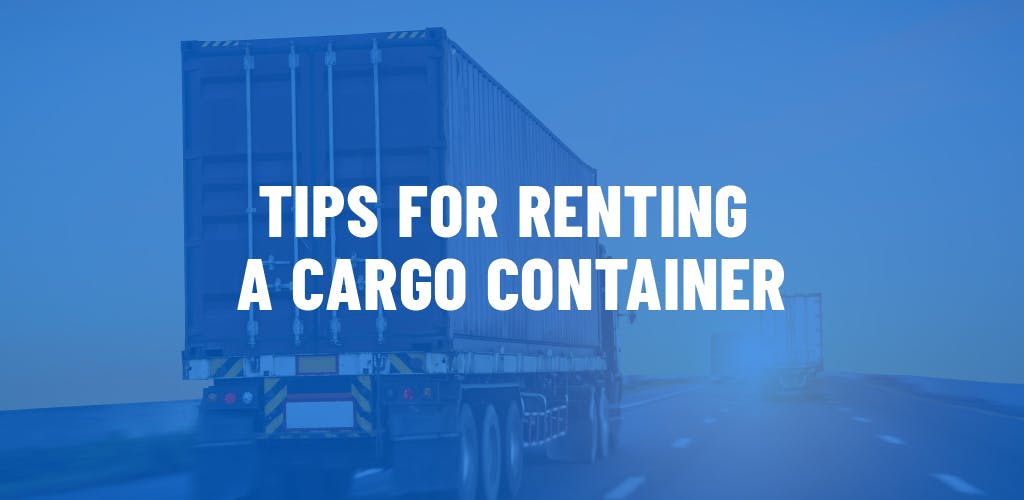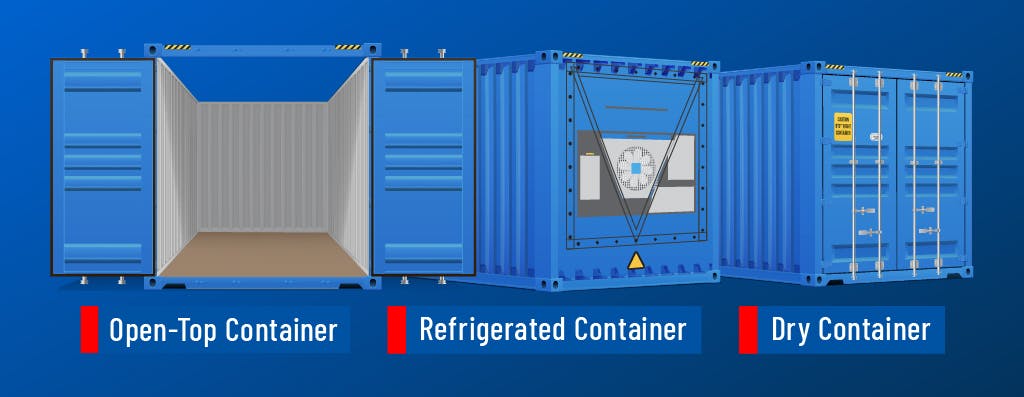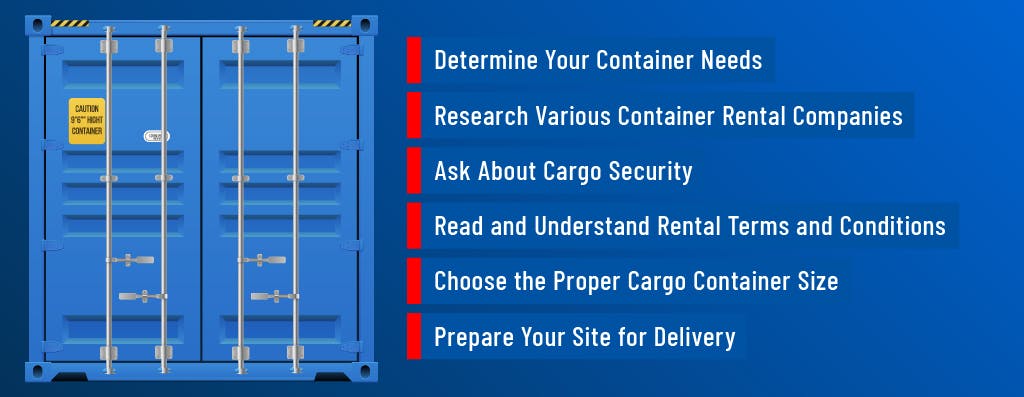Tips for Renting a Cargo Container
May 22nd, 2023

Renting a cargo container can be a great way to store your belongings or transport goods. However, there are a few things you need to know before getting a cargo container for rent. Let’s discuss the top tips for cargo container rental. We will cover everything from choosing the right size container, to finding a reputable rental company. Keep reading to see factors that will help you make an informed decision about renting a cargo container.
The Growing Popularity of Cargo Container Rental
Cargo containers are large metal boxes used for the transportation and storage of goods. They are designed to be sturdy and weather-resistant, with standardized sizes that allow for easy stacking and loading onto ships, trains, or trucks.
Renting a cargo container can be beneficial for individuals or businesses that require additional storage space or need to transport goods over long distances. They can also be used for a variety of purposes, such as temporary storage.
Renting a cargo container can be a cost-effective option compared to buying a new container. Getting a cargo container for rent is becoming increasingly popular due to its cost-effectiveness, flexibility, security, and sustainability. As more people become aware of the benefits of using cargo containers, we can expect to demand grow in the future.
Types of Cargo Containers

Cargo containers are highly versatile and can accommodate a wide range of items like heavy machinery and equipment. Depending on the type of cargo being transported, there are different container sizes and specifications available to ensure safe and efficient transportation.
The most common type is the dry container, which is designed to transport and store non-perishable goods such as electronics, furniture, and clothing.
Refrigerated containers, also known as reefer containers, are equipped with cooling systems that regulate the temperature and humidity levels, making them ideal for transporting perishable goods such as food and pharmaceuticals.
Open-top containers, on the other hand, feature an open roof and are commonly used for oversized or bulky cargo that cannot be loaded through the doors of a standard container.
Each type of container has its unique features and specifications, making it important to choose the right container for the type of cargo being transported or stored.
Understanding the different types of cargo that can be stored or transported in cargo containers is important for choosing the right container for your specific needs.
Now that we have discussed the types of cargo containers, let’s dive into the tips for cargo container rental.
7 Tips for Renting a Cargo Container
Renting a cargo container can be a great solution for those who need extra storage space or other needs. To start, determine the size and type of cargo containers you need based on your specific requirements. Compare pricing, delivery options, and customer reviews to make a sound decision. Consider these seven tips for renting a cargo container so that you make the best choice for your needs.

Determine Your Container Needs
This is a critical first step, so start by evaluating the type and volume of goods you plan to store or transport. Consider the dimensions of your items, their weight, and any special handling requirements they may have.
Next, think about the distance and duration of the transportation or storage period. The climate and environmental conditions in the area where the container will be placed will also need to be considered.
These factors will help you determine the appropriate size, material, and features of the container that will best suit your needs. Taking the time to assess your container requirements beforehand will make for a successful rental experience and save you time and money in the long run.
Research Various Container Rental Companies
When researching, look for reputable companies with a proven track record of providing high-quality containers and reliable service. Check customer reviews and ratings, then compare prices and financing from different providers.
Make sure to inquire about their rental agreements, payment terms, and any additional fees or hidden costs that may apply. Don’t be afraid to ask questions and clarify any doubts or concerns you may have. A thorough research process will help you make an informed decision and find the best company that meets your needs and budget.
Ask About Cargo Security
You want to be certain of the safety of your goods. Begin by asking the rental company about the type and quality of locks and seals they use. The level of surveillance and monitoring they provide will also be good to know. If your cargo is particularly valuable or sensitive, you may want to consider additional security measures, such as GPS tracking devices, alarm systems, or tamper-evident seals.
It’s also important to check if the rental company has insurance coverage in case of theft or damage to your cargo. By asking the right questions and taking appropriate security measures, you can have peace of mind and protect your goods during transportation or storage.
Read and Understand Rental Terms and Conditions
Rental agreements typically outline the responsibilities and obligations of both parties. This would be things like the terms of payment, delivery, and return of the container. Some common terms you may want to know include:
- Delivery and pick-up fees: The cost of transporting the container to and from the rental site.
- Insurance coverage: The type and amount of insurance provided by the rental company, if any.
- Maintenance and repair: The renter’s responsibility for keeping the container in good condition and covering any damage repairs.
- Termination clause: The conditions under which either party can terminate the rental agreement.
- Renewal options: The possibility of extending the rental period beyond the initial agreement.
Carefully review and understand all the terms and conditions, including any limitations, restrictions, and penalties that may apply. This will help you avoid any surprises or misunderstandings later for a smooth and hassle-free rental experience.
If you have any questions or concerns, don’t hesitate to ask the rental company for clarification before signing the agreement.
Choose the Proper Cargo Container Size
It’s essential to evaluate the volume and dimensions of your goods carefully to ensure they fit comfortably inside the container without any overcrowding or damage. You may also want to consider future growth or expansion needs and choose a size that will accommodate.
It’s important to note that container sizes vary depending on the type of cargo containers. Make sure to consult with the rental company about your cargo requirements and get their recommendations on the appropriate container size and type for your specific needs. A properly sized container will help protect your goods during transportation or storage for a successful rental experience.
Prepare Your Site for Delivery
Before the delivery date, clear and level the area where the container will be placed. Remove any debris or obstacles that may obstruct the delivery process. There should be enough space for the truck to maneuver and unload the container safely.
Also, check the accessibility of the site, including any height or weight restrictions. Have any permits or approvals required for delivery. By preparing your site properly, you can avoid any delays or damage during the process and ensure a smooth and hassle-free delivery.
Securing a Cargo Container
“How are shipping containers secured?” is a common question among those who are interested in shipping goods safely and securely. The container’s doors are typically secured using high-security padlocks and heavy-duty lockboxes to prevent unauthorized access. Tamper-evident seals are also applied to the container’s doors to ensure that they haven’t been opened during transit.
Additionally, GPS tracking devices are often used to monitor the container’s location and follow along so that it stays on its designated route. These devices can also provide real-time updates on the container’s condition, including temperature, humidity, and any impacts or shocks that may occur during transport.
By implementing these security measures, shipping containers can provide a reliable and secure means of transporting goods over long distances or storing them in remote locations.
Cost of Renting a Cargo Container
The average cost of renting a cargo container can vary greatly depending on several. Usually container size, duration of rental, location, and additional features such as climate control and security features set the price.
Container size is one of the biggest factors that will affect the price when selecting a cargo container for rent. Standard container sizes include 20-foot, 40-foot, and 45-foot containers.
The duration of the rental will also impact the cost. Short-term rentals of a few days or weeks may cost more per day than long-term rentals of several months or even years.
Location is another important factor in determining the cost of renting a cargo container. Prices may vary significantly depending on the region or country. For example, prices in urban areas may be higher than prices in rural areas. While prices in coastal regions may be higher due to shipping and handling costs. Additionally, prices may be impacted by demand in the area, as well as the availability of containers.
Additional features can also increase the cost of renting a cargo container. For example, if you require a container with climate control, the price will be higher than a standard container. Security features such as a locking system and cameras can also increase the rental price.
It is important to consider your specific needs and budget when deciding on a cargo container for rent, and to research local providers to compare prices and services.
Frequently Asked Questions
What are the different sizes of cargo containers available for rent?
The most preferred sizes are 20 feet to 40 feet. The largest options will be around 45 feet and the smallest options are around 10 feet. Know the volume of cargo you’ll be storing to determine which size cargo container you need.
Can I rent a cargo container for a short-term period?
Yes, it is possible to rent a cargo container for a short-term period. Many companies offer rental services for cargo containers, and the rental period can be customized according to your needs.
What is the process for renting a cargo container for shipping overseas?
To rent a cargo container for shipping overseas, you should first find a reputable shipping company. Then, choose the container size and type suitable for your needs, obtain a shipping quote of how much it costs to rent the container, provide the necessary documentation, and arrange for the container to be transported to the port. The shipping company will handle the logistics of shipping and customs clearance.
Rent a Cargo Container from Hale Trailer
Renting a cargo container can be an efficient and cost-effective solution for transporting goods or storing equipment. These tips for cargo container rental will get you prepared when searching for a cargo container for rent.
Hale Trailer offers a wide selection of cargo containers for rent with other options of trailers for sale. Our expert guidance and support to ensure your specific needs are met. With their extensive experience, Hale Trailer is a reliable partner for all your cargo container rental needs. Browse our lineup online or visit us at one of our locations today.
All the information on this website – https://www.haletrailer.com – is published in good faith and for general information purposes only. Hale Trailer Brake and Wheel does not make any warranties about the completeness, reliability and accuracy of this information. Any action you take upon the information you find on this website, is strictly at your own risk. Hale Trailer Brake and Wheel will not be liable for any losses and/or damages in connection with the use of our website.
